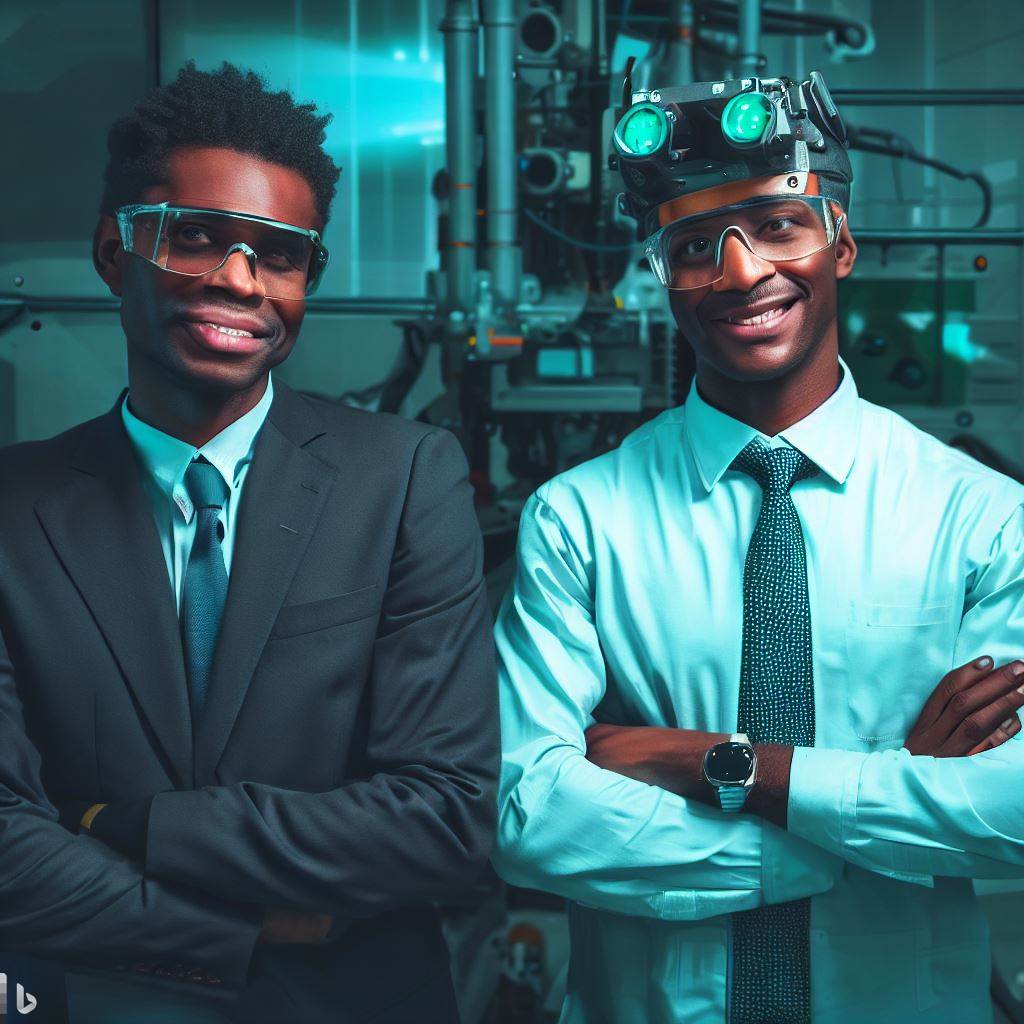Introduction
An optical engineer is a professional who specializes in the design and development of optical systems. The field of optical engineering is rapidly growing in Nigeria, with increasing demand for qualified professionals.
The purpose of this blog post is to provide insights into the daily life of a Nigerian optical engineer.
Definition of an Optical Engineer
An optical engineer is someone who applies the principles of optics and light to develop various technological solutions.
They work on designing and improving optical systems such as lenses, lasers, and fiber optics.
Overview of the Growing Field in Nigeria
In Nigeria, the field of optical engineering has gained significant momentum in recent years. With advancements in technology and the need for innovative solutions, optical engineers are in high demand.
Their expertise is utilized in industries like telecommunications, medical imaging, and renewable energy.
Purpose of the Blog Post
The purpose of this blog post is to shed light on the work and experiences of a Nigerian optical engineer.
We will explore their daily routine, challenges, and the impact they make in various sectors.
By sharing their story, we hope to inspire aspiring optical engineers and create awareness about this flourishing field.
Educational Background and Training
Nigerian optical engineers require a solid educational foundation and specific qualifications to excel in their field.
- Required education and degrees: Optical engineers usually hold a bachelor’s degree in Engineering or Physics, specializing in optics.
- Specialized training and certifications: Alongside formal education, engineers undergo specialized training in optical design, materials, and equipment.
- Importance of continuous learning: Continuous learning is crucial in this rapidly evolving field. Engineers attend workshops, conferences, and pursue higher degrees.
Sarah, a passionate Nigerian optical engineer, pursued physics and light-matter interactions, earning her engineering bachelor’s degree locally.
She focused on optics, learning electromagnetic theory, geometric optics, and photonics.
Internships with optical companies enriched her knowledge through practical experiences.
Seeking growth, she pursued a master’s in Optical Engineering abroad, delving into cutting-edge research and advanced optical design.
Returning to Nigeria, she joined a leading technology company in optical communications, equipped with extensive knowledge.
Sarah actively sought certified training, attending workshops and courses in fiber optics, lasers, and holography.
Her commitment to continuous learning led her to attend conferences, staying updated on advancements and networking with experts. Engaging in research projects, she pushed optical system design boundaries.
The importance of continuous learning in optical engineering is undeniable. Constantly emerging materials, techniques, and equipment necessitate adaptive engineers.
Training and certifications demonstrate competency and commitment to growth.
Employers value well-rounded engineers who tackle complex optical challenges. In conclusion, Sarah’s journey exemplifies the commitment needed for success in this ever-evolving field.
Continuous learning and specialized training ensure impactful contributions to optics.
Read: Challenges and Opportunities for Optical Engineers in Nigeria
Job Responsibilities
As an optical engineer in Nigeria, I design and develop optical devices and systems, conducting research and experiments for improvements.
Starting my day, I analyze new optical system requirements, understanding its purpose and specifications.
I design the optical system using specialized software, creating designs, calculating parameters, and simulating behavior.
Collaborating with engineers, I review and refine the design to meet all requirements. I move to the development phase, sourcing components and materials for the optical system.
Troubleshooting and repairing optical equipment is vital, using diagnostic tools to identify and fix issues.
Conducting research and experiments, I explore new technologies and enhance existing ones.
I stay updated with the latest advancements by reading research papers, attending conferences, and participating in technical discussions.
Collaborating with other engineers, I exchange ideas and share knowledge. In addition to design, I contribute to testing and validation, setting up experiments and analyzing data.
The lab is my workspace, where I work with optical equipment and conduct experiments. Being a Nigerian optical engineer allows me to contribute to technological advancements in optics.
Read: Future Prospects for Optical Engineers in Nigeria
Typical Work Environment
As a Nigerian optical engineer, my work environment is diverse and dynamic, offering a range of experiences throughout the day.
Office-based Work
- I begin my day at the office, where I check emails, plan projects, and communicate with clients.
- The office provides a calm and organized space for brainstorming ideas and conducting research.
- I collaborate with colleagues, sharing knowledge and expertise, ensuring optimal results in our projects.
- The office environment fosters creativity and innovation, allowing me to develop cutting-edge optical solutions.
Laboratory and Workshop Usage
- I often move from the office to the laboratory, where I conduct experiments and analyze optical components.
- The laboratory is equipped with advanced equipment, enabling me to test and troubleshoot optical systems.
- I work with precision instruments, measuring light properties and analyzing data for further evaluation.
- Regular calibration and maintenance of instruments ensure accurate results in my experiments.
- The workshop is another crucial area where I assemble, modify, and repair optical devices and instruments.
Fieldwork and On-site Visits
- Fieldwork is an essential part of my job, where I go to various locations to implement optical solutions.
- I conduct site visits to assess the feasibility and suitability of optical systems in different settings.
- During fieldwork, I perform tests, analyze data, and troubleshoot any issues that may arise.
- I also work closely with clients and stakeholders to understand their requirements and provide tailored solutions.
Collaboration and Communication with Colleagues
- Working with a team of skilled engineers, I engage in regular communication and collaboration.
- We discuss project progress, share insights, and brainstorm innovative approaches to optical engineering challenges.
- Through effective communication, we ensure smooth cooperation and coordinated efforts for project success.
- We leverage each other’s expertise, making use of diverse backgrounds and knowledge in our field.
In general, as a Nigerian optical engineer, my work environment encompasses office-based work, laboratory and workshop usage, fieldwork and on-site visits, as well as collaboration and communication with colleagues.
This diverse and dynamic work environment allows me to apply my skills and expertise to develop innovative optical solutions, contributing to advancements in the field.
Read: Mechanical Engineering: Inspiring Success Stories in Nigeria

Challenges Faced in the Field
As a Nigerian optical engineer, I face daily challenges—technical and managerial. To navigate them effectively, I address the following:
- Keeping up with changing technology: Continuous learning is crucial to stay updated in the field.
- Meeting client expectations and deadlines: Understand client requirements and manage time efficiently for high-quality results.
- Balancing multiple projects: Strong organizational and multitasking skills are essential for success.
- Effective communication and collaboration: Work with team members to manage multiple projects efficiently.
- Dealing with complex technical issues: Analyze problems, collaborate with experts, and propose effective solutions.
Working as a Nigerian optical engineer offers fulfilling opportunities to contribute to the field’s advancement and make a positive impact.
By continuously learning, improving skills, and staying updated, I overcome challenges and deliver exceptional results to clients.
Read: Insights into the Nigerian Optical Engineering Industry
Explore Further: The Future of the Prompt Engineering Field in Nigeria
Explore Further: How Opto-Mechanical Engineers are Shaping Nigeria’s Future
A Day in the Life
As an optical engineer in Nigeria, my busy day starts with promptly checking and responding to client emails.
I review project deadlines and assign tasks to team members. We hold a brief team meeting to discuss ongoing projects and share updates.
Next, I analyze optical designs and simulations using specialized software and mathematical models. Problem-solving and decision-making are crucial in this field.
I brainstorm with team members to find effective solutions to any issues that arise.
Afternoons are for client meetings where I provide detailed explanations and recommendations based on their needs. Maintaining strong client relationships is a priority.
I make time for a balanced and nutritious lunch to stay focused and energized.
Back at the office, my team and I create detailed project proposals to secure new projects and ensure client satisfaction.
I allocate time for professional development, attending webinars, reading research papers, and staying updated with industry trends.
As the day ends, I review my to-do list and prioritize tasks for the next day. I clear my workspace and organize files for a fresh start.
Casual conversations with colleagues foster a positive work environment, emphasizing teamwork and collaboration.
Heading home, I reflect on the day’s achievements and challenges, ready to start anew tomorrow.
Read: Universities Offering Robotics Engineering in Nigeria
Latest Developments in the Field
Optical engineering is a constantly evolving field, with new technologies and trends emerging regularly.
Emerging technologies and trends
- Fiber optics: The use of fiber optics in telecommunications and data transmission is gaining momentum.
- Photonics: The science of light manipulation and control is paving the way for advanced optical devices.
- Nanophotonics: The study of light at the nanoscale is revolutionizing the development of compact optical systems.
- Holography: The creation of three-dimensional images through the use of lasers offers exciting possibilities.
- Augmented reality: Optical engineers are exploring ways to enhance our perception of the world through optical displays.
Impact of new advancements on the work of optical engineers in Nigeria
The advent of new technologies has significantly influenced the day-to-day activities of Nigerian optical engineers.
- Increased efficiency: Advanced optical systems allow engineers to design more efficient devices and components.
- Improved data transmission: Fiber optics have revolutionized communication networks, enabling faster and more reliable data transmission.
- Enhanced imaging: Optical engineers can now develop high-resolution imaging systems for various applications.
- Optical sensors: The development of sensors based on optical principles has expanded the possibilities in fields such as healthcare and security.
- Energy-efficient lighting: Engineers are working on the design of energy-saving lighting solutions based on optical technologies.
Training and skill development to keep up with industry changes
Given the rapid pace of advancements in the field, optical engineers in Nigeria must continuously update their skills and knowledge.
- Continuing education: Attending workshops, seminars, and conferences allows engineers to stay informed about the latest developments.
- Specialized training: Taking courses in specific areas such as photonics or fiber optics enhances engineers’ expertise.
- Hands-on experience: Engaging in practical projects and research helps optical engineers apply new concepts and technologies.
- Collaboration: Networking with professionals from various disciplines fosters knowledge sharing and keeps engineers updated.
- Professional organizations: Joining industry associations provides access to resources and opportunities for professional growth.
In a nutshell, Nigerian optical engineers need to adapt to the latest advancements and trends in the field to remain competitive.
By embracing emerging technologies, staying updated through training, and collaborating with peers, they can continue to make valuable contributions to the optical engineering industry.
Conclusion
In summary, a day in the life of a Nigerian Optical Engineer is filled with challenges and rewards. We have seen how they work tirelessly to contribute to technological advancements in the country.
Their role is vital in shaping the future of technology and innovation.
Aspiring engineers in the field of optics should be encouraged to pursue their dreams and goals. The opportunities for growth in this field are vast, and the impact they can make is immense.
It is essential to continue pushing boundaries, asking questions, and seeking solutions to current problems.
Nigerian Optical Engineers play a crucial part in shaping the country’s future and ensuring that it remains at the forefront of technological advancements.
Their dedication and hard work are paving the way for a brighter and more innovative future.
Lastly, we have gained insights into the daily life of a Nigerian Optical Engineer and witnessed the importance of their role in technological advancements.
Let us continue to support and encourage these aspiring engineers as they work towards a brighter future.




